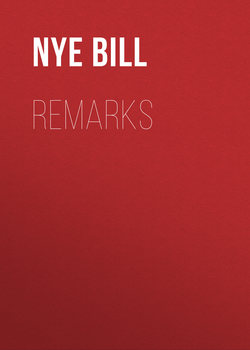Читать книгу Remarks - Nye Bill - Страница 43
The Old South
ОглавлениеThe Old South Meeting House, in Boston, is the most remarkable structure in many respects to be found in that remarkable city. Always eager wherever I go to search out at once the gospel privileges, it is not to be wondered at, that I should have gone to the Old South the first day after I landed in Boston.
It is hardly necessary to go over the history of the Old South, except, perhaps, to refresh the memory of those who live outside of Boston. The Old South Society was organized in 1669, and the ground on which the old meetinghouse now stands was given by Mrs. Norton, the widow of Rev. John Norton, since deceased. The first structure was of wood, and in 1729 the present brick building succeeded it. King’s Handbook of Boston says: “It is one of the few historic buildings that have been allowed to remain in this iconoclastic age.”
So it seems that they are troubled with iconoclasts in Boston, too. I thought I saw one hanging around the Old South on the day I was there, and had a good notion to point him out to the authorities, but thought it was none of my business.
I went into the building and registered, and then from force of habit or absent-mindedness handed my umbrella over the counter and asked how soon supper would be ready. Everybody registers, but very few, I am told, ask how soon supper will be ready. The Old South is now run on the European plan, however.
The old meeting-house is chiefly remarkable for the associations that cluster around it. Two centuries hover about the ancient weather-vane and look down upon the visitor when the weather is favorable.
Benjamin Franklin was baptized and attended worship here, prior to his wonderful invention of lightning. Here on each succeeding Sabbath sat the man who afterwards snared the forked lightning with a string and put it in a jug for future generations. Here Whitefield preached and the rebels discussed the tyranny of the British king. Warren delivered his famous speech here upon the anniversary of the Boston massacre and the “tea party” organized in this same building. Two hundred years ago exactly, the British used the Old South as a military riding school, although a majority of the people of Boston were not in favor of it.
It would be well to pause here and consider the trying situation in which our ancestors were placed at that time. Coming to Massachusetts as they did, at a time when the country was new and prices extremely high, they had hoped to escape from oppression and establish themselves so far away from the tyrant that he could not come over here and disturb them without suffering from the extreme nausea incident to a long sea voyage. Alas, however, when they landed at Plymouth rock there was not a decent hotel in the place. The same stern and rock-bound coast which may be discovered along the Atlantic sea-board to-day was there, and a cruel, relentless sky frowned upon their endeavors.
Where prosperous cities now flaunt to the sky their proud domes and floating debts, the rank jimson weed nodded in the wind and the pumpkin pie of to-day still slumbered in the bosom of the future. What glorious facts have, under the benign influence of fostering centuries, been born of apparent impossibility. What giant certainties have grown through these years from the seeds of doubt and discouragement and uncertainty! (Big firecrackers and applause.)
At that time our ancestors had but timidly embarked in the forefather business. They did not know that future generations in four-button cutaways would rise up and call them blessed and pass resolutions of respect on their untimely death. If they stayed at home the king taxed them all out of shape, and if they went out of Boston a few rods to get enough huckleberries for breakfast, they would frequently come home so full of Indian arrows that they could not get through a common door without great pain.
Such was the early history of the country where now cultivation and education and refinement run rampant and people sit up all night to print newspapers so that we can have them in the morning.
The land on which the Old South stands is very valuable for business purposes, and $400,000 will have to be raised in order to preserve the old landmark to future generations. I earnestly hope that it will be secured, and that the old meeting-house—dear not alone to the people of Boston, but to the millions of Americans scattered from sea to sea, who cannot forget where first universal freedom plumed its wings—will be spared to entertain within its hospitable walls, enthusiastic and reverential visitors for ages without end.
